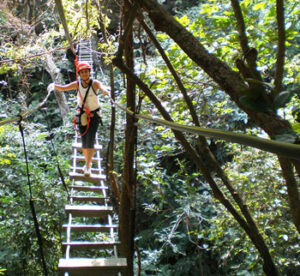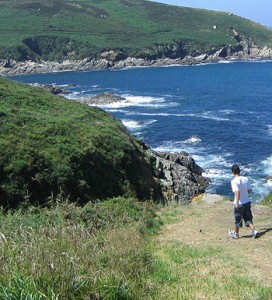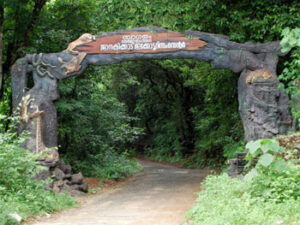
Vacations are a time when we tend to throw out the rules and relax, but that doesn’t mean we should stop being eco-friendly. Green tourism, (sometimes dubbed sustainable or responsible tourism) is focused on not wasting valuable resources, preserving the environment and not upsetting the ecosystem. It encourages us to “take only photos and leave only footprints.” Here’s how to go eco-friendly visitor while vacationing:
1. Re-use that towel
Let housekeeping know they don’t need to change your sheets and towels every day. Hotels with 300 rooms use around 12,000 gallons of water each month and over 80 gallons of detergent. That adds up to a lot of water and can be a burden in places where water is in short supply. You don’t change your sheets and towels that often at home so why do so while on vacation? The universal signal for re-using your towels is to put the towel back on the rack. A towel on the floor means, ‘Please exchange.’
2. Turn if off.
Shut off the AC, heat, lights and TV when you leave your room. There’s no point in cooling the air when there is no one in the room and leaving it on can waste a lot of electricity. Air conditioning cools the air fairly quickly, so it won’t take that long to cool down your room. You can also keep you blinds closed to keep your room cool.
3. Buy bulk
Ignore those itsy-bitsy bottles of shampoo and soaps—they add up to millions of pounds of soap heading to landfills and polluting the ground water. You’ve probably bought your own favourite brand of shampoo and soap in a larger format. If you didn’t, consider buying a larger bottle from the local store and ignore those wasteful bottles. Ask if your hotel is participating in Clean the World, a company that distributes recycled soap products worldwide to impoverished counties.
4. Stop the timer
Turn off the sauna, whirlpool, and exercise equipment when you’re finished with them. Many hotels have installed timers on their saunas and whirlpools, but you can do your bit by making sure the timers don’t keep ticking after you’re done.
5. Think before picking up

Only take brochures or maps that are absolutely necessary and return all others. It’s great to collect information on where to go and what to do but those glossy flyers were once trees. See if you can get one main local guide that lists everything. Some hotels also offer free browsing to their guests so you can look up information on the Net as well.
6. Look before you buy
Avoid products made from endangered species such as tortoise shell, ivory or black coral. Buying these products creates a market that encourages poachers to kill the animals. Not sure which species are endangered? The World Wildlife Federation publishes a list of endangered species. You can also visit Convention on International Trade in Endangered Species of Wild Fauna and Flora, commonly known as CITES, to find out which species should be avoided.
7. Walk gently
Take only photographs and leave only footprints when you visit nature reserves, biospheres or national parks. Remember – it’s a privilege to visit these pristine places. Keep your distance from the wildlife and stay on the designated trails. Pay the entrance fees to protected sites since this money goes towards upkeep and staff. Pick up any litter you find along the trails. Bring your garbage out with you and never litter on any of the trails.
8. Respect the local people
Learn a few words of the local language so you can have basic communication. Try to dress appropriately according the local conventions so you don’t make the locals uncomfortable. Ask before snapping that photo—some cultures don’t like having their photos taken. Be especially sensitive around sacred places or religious shrines.
9. Support the local economy
 Book day trips with local businesses that are licenced to do tours. Eat in local restaurants, shop at the local markets, and attend local events. Make sure your tourist dollars go back into the community. Too often the money paid to all- inclusive resorts never gets to the locals.
Book day trips with local businesses that are licenced to do tours. Eat in local restaurants, shop at the local markets, and attend local events. Make sure your tourist dollars go back into the community. Too often the money paid to all- inclusive resorts never gets to the locals.
10. Sleep green
Before booking your holiday, find a green hotel through the Green Hotels Association or the Audubon Green Leaf Eco-Rating Program. After staying at a eco-friendly hotel, let management know you appreciate their efforts to go green and that you’re happy to lend your support. Your voice is important in the growing field of eco-tourism.
11. Support green tour operators
Check with your travel agent for green tour operators. When booking a tour, bring along a copy of the Ten Commandments on Eco-Tourism issued by The American Society of Travel Agents (ASTA) for its agents and tour
operators. It offers some great guidelines that you can use to determine if the tour you are about to take is actually green.

12. Stay open to suggestions
Keep learning more on how to become an eco-friendly traveler. The industry is always changing and developing so it’s good to keep up to date. The International Ecotourism Society (TIES) publishes several guides including the 2010-2011 Travel Green Guide listing tour operators and hotels doing their bit to be sustainable. The guide is free to anyone interested in becoming an eco-tourist.
Whether you are exploring your own backyard or heading out farther afield to more exotic locations, you can reduce your footprint on the planet and still have a good time.

